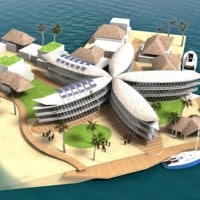Construction of the world’s first floating city may begin soon off the coast of Tahiti in French Polynesia.
ABC News reports the country’s Government has signed an agreement with the USA’s Seasteading Institute and construction could commence in 2019.
“So much of the world — places like Kiribati and many of the islands of French Polynesia — are threatened by rising sea levels,” said the institute’s executive director, Randolph Hencken
“We are planning to spin off a new industry of floating islands that will allow people to stay tethered to their sovereignty as opposed to having to flee to other countries.”
The Institute is comprised of self-described “credentialed, qualified, pragmatic idealists”.
A study (PDF) carried out for the Institute in 2013-14 found that enough water could be collected from a floating city to meet requirements; depending on location of the project. Based on the amount of available rooftop space, the study also determined solar panels could meet electricity needs more cheaply than diesel-based generation, even after adding the costs of a microgrid – including battery storage.

Given the advances and cost reductions in solar and storage technology since then, it’s safe to assume taking the solar + battery route would now be even more economical.
Diesel generators might still play a role in the Floating City Project, but only as an emergency backup system.
The seasteading concept is more than about escaping rising sea levels.
“Obsolete political systems conceived in previous centuries are ill-equipped to unleash the enormous opportunities in twenty-first century innovation,” says the Institute’s web site.
“Seasteaders envision a vibrant startup sector for governance, with many small groups testing out innovative ideas as they compete to better serve their residents’ needs.”
It’s not clear how much autonomy the pilot project will be granted given the floating city won’t be in international waters – that is yet to be negotiated.
The French Polynesian government will now work with the Institute to create a legal structure for seazones with a special governing framework by the end of this year. Site-specific environmental studies and economic impact studies will be required to justify the creation of seazones.
The project is expected to start out with hub businesses – most likely in aquaculture, cleantech and tourism – then it will grow organically into a village and ultimately into a city. As technology is developed and tested, the community will move further away from shore.
French Polynesia is in the South Pacific and comprises more than 100 islands, of which Tahiti is the largest.
More about seasteading and the Floating City Project can be viewed here.












































